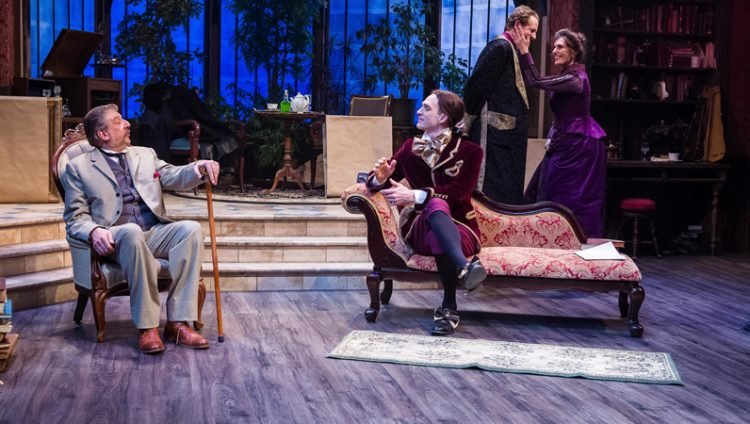
Out of the dustbin crypt of literary history, a witty new superhero phoenix takes flight. Ladies and gentlemen, I present “Sherlock Holmes and the Adventure of the Elusive Ear,” now playing in Chelsea at Jeff Daniel’s Purple Rose Theatre Co.
Mark Colson as Sherlock, arrives on Bartley H. Bauer’s exquisite replica of a Victorian era drawing room, which includes an arcane semi-hemispheric solarium.
He is clad in a post-Dr. Moriarty era behind-the-scenes version of not what we recall as his more dapper self. He comes stumbling onto the stage in bedclothes and bathrobe, slippers and stocking cap, a bit befuddled. Colson clears the character’s mind quickly with much of Holmes’s acerbic wit, as he encounters Dr. Watson in need of a new story and income to support their lavish lifestyles.
Colson is a tall-drink-of-water laconic version of Sherlock. He glides across the stage, completely at ease with this historic well-known character, comic timing and word puns abounding.
Watson, played drolly by Paul Stroli, is the consummate bromance-buddy, looking out for Holmes in all situations. Writer David Macgregor’s incarnates the traditional Holmes’ story — Holmes as the world’s greatest detective — then adds a fresh and twisty spin on the role of Holmes’ housekeeper, Irene Adler.
The old Adler is now transformed into a sidekick with pizazz. She is equal in wit, a partner in crime-stopping, a fiery feminist, a lover and confidante. Sarob Kamoo is a saucy Adler — every bit Holmes’ equal in deductive logic.
When a deceptively mourning potential client arrives, Caitlan Cavannaugh as Maria Chartier, it is Adler who smells a rat. When Chartier turns out to be the evil goddaughter of the now deceased Dr. Moriarity. She whips out a sword from the dark recesses of a billowy black dress.
Rather than engaging en garde, Holmes throws his rapier over to Adler. She engages and dominates the swordplay with Chartier. Kamoo moves across the stage with a fluidity equal to that of Cavannaugh. Their fight choreography is chemistry, a dueling duo, a dance in intimate conflict.
Cavannaugh’s Inspector Clouseau’s version of a French accent adds much humor to her character. Writer Macgregor takes a page from writer E. L. Doctorow, introducing and merging real characters from history with the classically fictional Holmes and Watson.
Tom Whelen arrives onstage as an ear-bandaged Vincent Van Gogh with a sordid story about cutting off his ear to demonstrate his love for a woman. Believing the ear to have been stolen by Gaugin, he now wants Holmes to recover it. Whelen is picture-perfect in this role, elaborating much of what we already know about Van Gogh. Then he disappears for much of the play only to be at the center of solving the crime at the play’s end.
The crime, if there is one, is a murky piece of business. A charming and eccentric Oscar Wilde appears out of nowhere, delivering a worthy monologue as to why someone might steal worthless post-impressionist paintings from starving artists.
Rusty Mewha as Wilde is equal in wit to Holmes and flirts articulately with Adler, claiming bisexuality. Who knew?
In the end, it is Holmes’ attention to seemingly minuscule and insignificant data that brings the convoluted aspects of this script to a somewhat satisfying and typical aha-with-an-exclamation-point conclusion. Case closed. On to the next adventure.
To view a full list of show times and purchase tickets visit here.
Support City Pulse - Donate Today!
Comments
No comments on this item Please log in to comment by clicking here